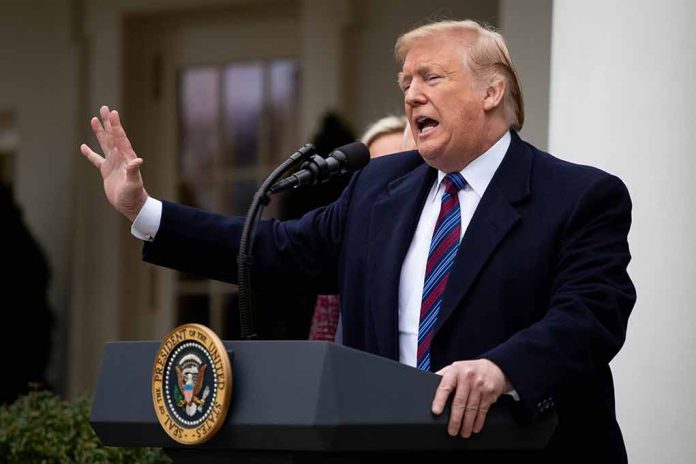
The Trump administration is considering high-profile immigration raids in Washington, D.C., signaling a dramatic shift in enforcement policy.
At a Glance
- Trump’s team plans workplace raids targeting undocumented immigrants in D.C. area
- Raids focus on industries like agriculture, construction, hospitality, and healthcare
- Move aligns with campaign promises of large-scale deportations
- Immigrant rights groups prepare legal challenges and protests
- Concerns raised about potential economic impact of mass deportations
Trump Administration’s Bold Immigration Enforcement Plans
The incoming Trump administration is reportedly considering conducting high-profile immigration enforcement actions in the Washington, D.C. area, specifically targeting workplaces. These potential raids, as reported by NBC News, are part of President-elect Donald Trump’s broader approach to immigration policy, emphasizing strict law enforcement and curbing illegal immigration.
Discussions with U.S. Immigration and Customs Enforcement (ICE) have focused on workplace raids to arrest workers suspected of living and working in the U.S. illegally. Potential targets for these operations include businesses in agriculture, construction, hospitality, and healthcare industries.
Trump transition team considering immigration raid of a D.C.-area business https://t.co/bM4gHyJHtD
— Morning Joe (@Morning_Joe) January 9, 2025
Strict Enforcement and Campaign Promises
The planned raids align with Trump’s campaign promise of large-scale deportations, not limited to immigrants with criminal histories. This approach marks a significant departure from previous administrations, such as Obama and Biden, which focused on targeting employers violating labor laws rather than conducting mass arrests.
These enforcement actions would serve to publicly reinforce the administration’s priority to implement existing immigration laws while reflecting their commitment to a rigid immigration policy. However, it’s important to note that workplace raids are logistically complex and costly, requiring significant manpower and investigation.
Opposition and Concerns
In response to these plans, immigrant rights groups are preparing protests and legal challenges. They are urging Democratic-led states and cities to resist aiding deportations. The American Civil Liberties Union (ACLU) has launched a campaign to share asylum seekers’ stories to counter Trump’s deportation plans.
Concerns have been raised about the economic impact of mass deportations, as undocumented workers play crucial roles in key sectors of the U.S. economy. A report estimates that deporting 8.3 million undocumented immigrants could cut GDP by 7.4% and reduce employment by 7% by 2028.
Trump transition considering D.C.-area showcase immigration raid in first days of administration@JuliaEAinsley @carolelee https://t.co/9x9N89U5l8
— Natasha Korecki (@natashakorecki) January 8, 2025
Economic Implications
The potential economic consequences of these immigration enforcement actions are significant. Another study suggests that immigrant workers will be the only source of labor force growth in the U.S. by 2052. Latinos, in particular, contribute significantly to the GDP and are driving entrepreneurship, with Latino-owned businesses growing rapidly.
As the Trump administration prepares to implement these enforcement measures, the debate over immigration policy and its economic implications continues to intensify. The coming months will likely see increased tensions between federal immigration enforcement efforts and local resistance, as well as potential legal challenges to the proposed raids.
Sources:
- Trump Planning D.C. Workplace Raids On First Days Of Administration To Kick Off Immigration Crackdown
- Trump Admin Considering Immigration Raid in First Days | Newsmax.com
- Trump transition team considering immigration raid of a D.C.-area business
- Trump Admin Considering Immigration Raid in First Days | Newsmax.com














